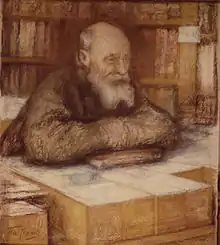Russian cosmism
Russian cosmism, also cosmism, is a philosophical and cultural movement that emerged in Russia at the turn of the 19th century, and again, at the beginning of the 20th century. At the beginning of the 20th century, there was a burst of scientific investigation into interplanetary travel, largely driven by fiction writers such as Jules Verne and H. G. Wells as well as philosophical movements like the Russian cosmism.
_3.png.webp)
Theory
The Culture of Health is the basic science about Spiritual Humanity. It studies the perspectives of harmonious development of Spiritual man and Spiritual ethnos as a conscious creator of the State of Light into the territory of the Solar System
Cosmism entailed a broad theory of natural philosophy, combining elements of religion and ethics with a history and philosophy of the origin, evolution, and future existence of the cosmos and humankind. It combined elements from both Eastern and Western philosophic traditions as well as from the Russian Orthodox Church.[3]
Cosmism was one of the influences on Proletkult, and after the October Revolution, the term came to be applied to "...the poetry of such writers as Mikhail Gerasimov and Vladimir Kirillov...: emotional paeans to physical labor, machines, and the collective of industrial workers ... organized around the image of the universal 'Proletarian', who strides forth from the earth to conquer planets and stars."[4] This form of cosmism, along with the writings of Nikolai Fyodorov, was a strong influence on Andrei Platonov.[1]
Many ideas of the Russian cosmists were later developed by those in the transhumanist movement.[1] Victor Skumin argues that the Culture of Health will play an important role in the creation of a human spiritual society into the Solar System.[5][6]
Representatives
Among the major representatives of Russian cosmism was Nikolai Fyodorovich Fyodorov (1828–1903), an advocate of radical life extension by means of scientific methods, human immortality, and resurrection of dead people.[7]
In 1881, Russian revolutionary and rocket pioneer Nikolai Kibalchich proposed an idea of pulsed rocket propulsion by combustion of explosives, which was an early precursor for Project Orion.
Konstantin Tsiolkovsky (1857–1935) was among the pioneers of theoretical space exploration and cosmonautics. In 1903, Tsiolkovsky published the first serious scientific work on space travel. His work was essentially unknown outside the Russian Empire, but inside the country it inspired further research, experimentation and the formation of the Society for Studies of Interplanetary Spaceflight.[8] Tsiolkovsky wrote a book called "The Will of the Universe; Unknown Intelligent Forces" in which he propounded a philosophy of panpsychism. He believed humans would eventually colonize the Milky Way. His thought preceded the Space Age by several decades, and some of what he foresaw in his imagination has come into being since his death. Tsiolkovsky did not believe in traditional religious cosmology, but instead he believed in a cosmic being that governed humans.[9]
Alexander Bogdanov (1873-1928) was a Russian and later Soviet physician, philosopher, science fiction writer, and Bolshevik revolutionary. His wide scientific and medical interests ranged from the universal systems theory to the possibility of human rejuvenation through blood transfusion. He saw heterochronic blood transfusions as a alliance of solidarity between the generations, where the old benefited from the rejuvenating effects of the young blood, while the young received immunities from the elders blood. Ironically, he died as a result of a hemolytic transfusion reaction. His successors put Russia in the forefront of the development of centralized national blood transfusion services.[10]
Other cosmists included Vladimir Vernadsky (1863–1945), who developed the notion of noosphere and the question of noosphere's evolution from biosphere, and Alexander Chizhevsky (1897–1964), pioneer of "heliobiology" (study of the sun's effect on biology).[11][12][13] A minor planet, 3113 Chizhevskij, discovered by Soviet astronomer Nikolai Stepanovich Chernykh in 1978, is named after him.[14] The outstanding Russian palaeontologist and sci-fi writer Ivan Yefremov developed the ideas of cosmism and has concluded that the communism is a necessary structure of the future society, which wants to survive in space. The successor of the traditions of Ivan Yefremov was a geologist and sci-fi writer Alexander Shalimov. The astrophysicist Nikolai Aleksandrovich Kozyrev was the discoverer of Lunar tectonic activity (1959) and author of Causal Mechanics/Theory of Time.
Gallery of Russian Cosmists
See also
Citations
- Art works by Russian cosmism painter XX – XXI ct. Catalogue of exhibition 2013. Roerich museum. 2013. Archived from the original on 3 February 2020.
{{cite book}}: CS1 maint: unfit URL (link) - Kovaleva E. A. (2009). "Педагогический совет. Культура здоровья учащихся как фактор здоровьесберегающей среды школы. Слайд 7" [Pedagogical Council. Slide 7 of the presentation "culture of health" to the lessons of physical education on the theme the "Health"]. 900igr.net. Archived from the original on 21 November 2021. Retrieved 27 December 2021.
- Berdyaev, Nikolai. "The religion of resuscitative resurrection The "Philosophy of the Common Task" of N. F. Fedorov". berdyaev.com. Archived from the original on 14 October 2018.
- Thomas Seifrid, A Companion To Andrei Platonov's The Foundation Pit (Academic Studies Press, 2009: ISBN 1-934843-57-1), pp. 69-70.
- Skumin, V. A. (1995). Культура здоровья — фундаментальная наука о человеке. [A Culture of Health as a fundamental human science.] (in Russian). ISBN 5-88167-003-5. Archived from the original on 23 June 2021.
- "Концепция Учения" [The Concept Of Doctrine]. kult-zdor.ru. Archived from the original on 27 June 2021.
- Young, George M. (2012). The Russian Cosmists: The Esoteric Futurism of Nikolai Fedorov and His Followers. Oxford University Press. p. 12. ISBN 978-0-19-989294-5.
- Van Riper, A. Bowdoin (29 October 2007). Rockets and Missiles: The Life Story of a Technology. JHU Press. pp. 26–28. ISBN 978-0-8018-8792-5. Retrieved 13 October 2018.
- Tsiolkovsky, Konstantin Eduardovich (1928). The Will of the Universe; Unknown Intelligent Forces (in Russian). Kaluga. p. 23. Archived from the original on 19 October 2018.
{{cite book}}: CS1 maint: location missing publisher (link) - Huestis, Douglas. (2007). Alexander Bogdanov: The Forgotten Pioneer of Blood Transfusion. Transfusion medicine reviews. 21. 337-40. 10.1016/j.tmrv.2007.05.008.
- L. V. Golovanov, Alexander Chizhevsky entry in the Great Russian Encyclopedia, Moscow, 2001 edition. See Google.Translate version of the article from the Russian version of the Encyclopedia.
- Soiuz Pisatelei, Soviet literature, Issues 1-6, p 188, Foreign Languages Publishing House, 1982.
- James T. Andrews, “Red cosmos: K.E. Tsiolkovskii, grandfather of Soviet rocketry”, Issue 18 Centennial of Flight Series, p 114, Texas A&M University Press, 2009, ISBN 1-60344-168-9, ISBN 978-1-60344-168-1
- "3111 Misuzu 1977 - Google Search". www.google.com.
Further reading
- Boczkowska, Kornelia The Impact of American and Russian Cosmism on the Representation of Space Exploration in 20th Century American and Soviet Space Art. Poznan: Wydawnictwo Naukowe UAM, 2016. The Impact of American and Russian Cosmism on the Representation of Space Exploration in 20th Century American and Soviet Space Art
- Nikolai Fyodorov: Studien zu Leben, Werk und Wirkung (Nikolai Fyodorov: Studies to His Life, Works and His Influence) :by Michael Hagemeister:(München: Sagner, 1989):ISBN 3-87690-461-7:Originally presented as the author's thesis (doctoral) — Philipps-Universität Marburg, 1989.
- Michael Hagemeister: "Russian Cosmism in the 1920s and Today". In: Bernice G. Rosenthal (ed.): The Occult in Russian and Soviet Culture (Ithaca, London: Cornell UP, 1997), pp. 185–202.
- Young, George M. The Russian Cosmists: The Esoteric Futurism of Nikolai Fedorov and His Followers. New York: Oxford University Press, 2012. The Russian Cosmists: The Esoteric Futurism of Nikolai Fedorov and His Followers
- Frédéric Tremblay: "George M. Young, The Russian Cosmists, Oxford University Press, 2012, x + 280 pp.", Slavonic and East European Review, vol. 94, n. 1, pp. 155–158.
External links
- R. Djordjevic Russian Cosmism (with the Selective Bibliography) and its Uprising Effect on the Development of Space Research (PDF)
- Brief overview of Russian philosophy
- PHILTAR - Comprehensive web site with links to texts and resources
- Gallery of Russian Thinkers edited by Dmitry Olshansky
- Russian philosophy - entry in the Internet Encyclopedia of Philosophy.
- Directory of links to Russian philosophers, mostly in Russian
- Tsiolkovsky's Imperative in the 21st Century Academic paper
- Virtual Matchbox Labels Museum - Russian labels - Space - Page 2 - Konstantin Tsiolkovsky Historic images
- Tsiolkovsky from Russianspaceweb.com
- Spaceflight or Extinction: Konstantin Tsiolkovsky Excerpts from "The Aims of Astronautics", The Call of the Cosmos
- The Foundations of the Space Age
- Russian Cosmism
Videos
- Pastor Moabel. "Russian Cosmism, Perpetual Generations Abraham's Seed, 500 Quadrillion People". youtube.com. Archived from the original on 2021-12-12. Retrieved 26 September 2019.
- "Roerich. The Call Of Cosmic Evolution". youtube.com. Archived from the original on 2021-12-12. Retrieved 7 January 2018.

%252C_1934.png.webp)


